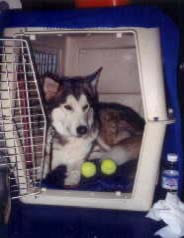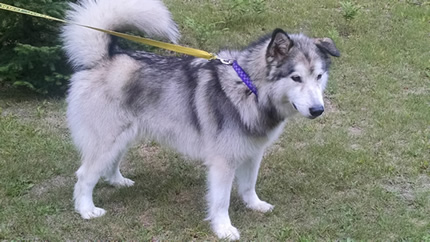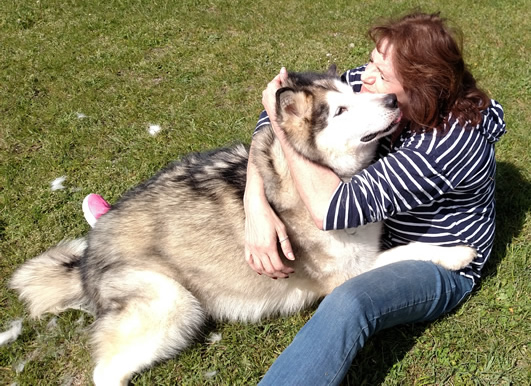What a Sitter Must Know About Caring for Your Alaskan Malamute
(Friend, neighbor, or the Unprepared)
To Owner:
When considering a pet sitter you really need to think about the experience they have with Malamutes. A friend or neighbor is great, but not always prepared for the stuff your mal can dish out because they are disappointed you are gone. Sometimes a kennel or professional sitter is a better option than a well-meaning friend, relative or neighbor! I'll tell you why - it's because your Malamute will not be happy he/she was left and will test the person to the max - even if the dog likes them or knows them well. So start off on a good foot and offer to pay something for their help. No one in their right mind will take in someone else's' Malamute unless they absolutely love dogs and the breed, once they realize what they've got themselves into! I'm sure more than once dogs have been dropped off at the humane society because the 'sitter' threw up their hands in frustration!
Don't even consider someone without a securely fenced yard or that subscribes to 'boundary training '....they'll never get it. They will eventually get sick of watching or walking your dog and will let it out 'just this once' and he'll be gone. Inspect their yard as if it were your own. If they promise to walk your dog on leash, make sure it's someone you can trust to do so. Do they walk their own dogs on leash? People tend to assume your dog will be just like theirs - and that's not necessarily so.
Ok, so you found someone willing to take on this huge responsibility, and they 'get it' - this is not your run of the mill lab. You did prepare them for all the hair the dog will drop on the carpet right? You also gave them a big bag of food - in a dog-proof container to use as well (nothing like a call at 3am that the dog got into the food and is at the vet for bloat). You also gave them the Mal's regular schedule so they will understand when she becomes incredibly demanding at 9pm - jumping around and vocalizing and she's already eaten. (that was when you took her for a daily walk so it's good for the sitter to know this even if they aren't taking her for walks because she WILL drive them crazy expecting her routine to be the IDENTICAL.) If you allow your pets on furniture and the sitter doesn't...these are things to be aware of and make your sitter aware of. You don't want your Malamute to be a rude houseguest through no fault of her own.
The crate. Many people don't believe in crates, and that's OK if you never need to leave your dog with someone else - but 'sh*t happens' and some day you will. ALWAYS crate train your dog, and occasionally use it to keep them used to the idea. You may save his life and someone's sanity by doing so!. If you still need more convincing...read this.
Put identifying info on your dog. Ideally a cell-phone number and how you can be reached. If he should escape the babysitter, the person they will be contacting is YOU. Ideally you need a tag on him with the sitter info as well, but collars come off and I'd hope you have your dog micro chipped. And the microchip information will be YOURS. It's useless if it is a home phone number and you're in New Zealand. So make sure it's something that works in contacting you or have a tag made with the sitter's info on it.
Let your sitter know about food aggression, or other quirks and the best way to handle those quirks. All Mals have quirks. With the wrong information, these could turn out to be dangerous quirks. A toddler going for a food-aggressive Malamute's bowl, another dog stealing a toy-possessive dog's toy. A dog that flies out open doors. You NEED to give your sitter this information and how to handle it properly (feed in crate, no special toys, etc.). Brainstorm all the crazy things your mal has done and how you avoided disaster - then let your sitter in on this information. You reall don't want them angry because the Mal stole the roast off the countertop do you?
Make sure your dog is up to date on all vaccinations, and give the sitter any paperwork. This could mean a quarantine vs. a mandatory kill order. Know the laws in their state and how things are typically handled. If veterinary bills are involved, expect to pay for them. And ALWAYS offer to pay for any damage the dog does to homes, people or other dogs. Odds are pretty good they will only tell you about the BIG things, but you know the Malamute chews up potholders or has peed on the table legs and the sitter was kind enough to say nothing about these minor transgressions....
To Sitter:
Know what you are getting into. First thing is many mals will become truly picky eaters, even a dog that normally inhales it's food. This is normal. You do not have to entice him with chicken, steak or your dinner. He will not starve himself to death. Put down the food, give him a reasonable time to snub you then pick it up. This is why you want some of his regular food - if you don't he'll play psych games with you and make you begin to think it's the food. This eliminates that possibility. After a couple of days he will eat reluctantly, (and respect you for not giving in).
The second and more important thing to be aware of is many mals will not like that their routine is disrupted and will consider going over your fence in an attempt to go home - just like the angry child with a suitcase packed for Grandma's! Every mal we've ever babysat gave this serious thought - even the ones that were not typically escape artists. They would roam the perimeter, then casually jump up and look over the top to test how high and secure the fence was. They were figuring out if it's climb or jump-able. The escape artists took it to a new level. Watch her when she goes outside to play or do her business, at least until you are absolutely sure she isn't going anywhere and isn't conning you to think she isn't going anywhere. Some will do the 'ho hum, don't care' but the minute you aren't watching (or think you aren't watching) they are digging to China or attempting to scale the wall. Unless you live in a prison or fortress, you may have to tether within the yard on a long line if you don't have at least a 6' fence that can't be dug under with no gaps or holes...if there aren't holes, be aware many Malamutes will install them.
Third, unless you never leave your house or go outside, you will need a sturdy crate. I said sturdy and that will vary depending on the dog. But most importantly, get an honest answer about whether the owner has crate-trained his dog. If he hasn't, and you need to leave the house, this may be the breaking point. Separation anxiety is a real possibility for many mals when they are left in a strange place and you will see first-hand how easy it is to break out of the crate. Once out, he may or may not destroy your house. Make sure the first couple of times you leave it's for short periods, to minimize any damage that may occur should he escape and get into something. Take it slow, because you need to know how he will react, and he needs to get used to your leaving, even if he was well crate trained before. I'll never forget the time we left Penny with her breeder for a few hours while we went into town for a nice dinner. She was locked in a crate in their motor home. We returned to find her looking out the window, with no visible means of how she escaped the LOCKED crate. We've had other dogs fundamentally destroy a crate getting out. Not every dog has the finesse of Penny.
A dog that has not been crate trained will be very difficult to manage (more about this here). He will whine, he will pout (with his back to the door), he may scream, he will look sad and sullen, he may try to bite the crate or chew the bars/plastic - or bust out! And that's just for starters. A dog that has never had to spend some time in a crate can be downright dangerous to himself and your home. We've babysat many mals, and for the most part they had at least a minimal amount of crate training. However a couple did not and they managed to destroy crates and escape when we weren't home and generally create havoc with our other dogs. You may think that is fine, I won't use a crate then (never liked them anyway) but that could be a very bad outcome. Unless your pets and the Malamute are best friends, never have the hint of a fight, and are opposite sexes they should NEVER be left alone together. That doesn't even consider a Mal in a house with cats, ferrets, bunnies or small dogs. Why? Because something as small as a crumb can create a hellacious fight and what if you're not there to stop it? Dogs should be separated, at least by the crate bars when no adult is home. This is for the safety of everyone.
he may scream, he will look sad and sullen, he may try to bite the crate or chew the bars/plastic - or bust out! And that's just for starters. A dog that has never had to spend some time in a crate can be downright dangerous to himself and your home. We've babysat many mals, and for the most part they had at least a minimal amount of crate training. However a couple did not and they managed to destroy crates and escape when we weren't home and generally create havoc with our other dogs. You may think that is fine, I won't use a crate then (never liked them anyway) but that could be a very bad outcome. Unless your pets and the Malamute are best friends, never have the hint of a fight, and are opposite sexes they should NEVER be left alone together. That doesn't even consider a Mal in a house with cats, ferrets, bunnies or small dogs. Why? Because something as small as a crumb can create a hellacious fight and what if you're not there to stop it? Dogs should be separated, at least by the crate bars when no adult is home. This is for the safety of everyone.
Other things you can expect is the Malamute won't listen to you. She may love you normally, but this is different. Somehow YOU are responsible for her family being gone (in her eyes) and therefore she may not cooperate. You call her to come in, she won't. You discipline her and she gets aggressive. Remember she is under a LOT of stress - any Malamute is without it's pack - so she will NOT come when you call or respect your authority like she did when her owner was nearby. Sometimes she may obey, just to confuse you, then defy you next time. This can be very disconcerting. We had a professional pet sitter and friend once stay with 4 of our gentlest dogs - Riggs, Jazzy, Mula and Pod..when I asked her to sit a second time she refused. She never said why. I suspect the grumbles and growls of Malamute talk unnerved her to the point she said never again. Yes, it's just talk...but to someone who is not familiar with Malamute vocalizations it can be pretty unnerving, if not terrifying.
Food and dog aggression in Malamutes is real. The owner is not just telling you this because she wants her dog to get special treatment. If you are warned about these things take it seriously. If the Malamute doesn't like a neighbor dog, keep them apart. If the Malamute is food aggressive, feed her in her crate, locked away from other dogs. This is VERY important. Many people have thought they knew better and it would be 'OK' to let dogs that barely know each other out to 'play together' with disastrous results. Even if they are friends, keep in mind the Malamute will be under a lot of stress and while normally gets along with some dogs, may not now. ALWAYS have a backup plan if things deteriorate between the Malamute and your own dogs. Don't be afraid to use baby gates and doors to keep control of situations. Always have control of the situation. If there is any doubt, don't do it.
If you have the owner's permission to take the dog for walks, be aware this is a VERY strong dog. You will need strength and good control or the dog will drag you - up a tree to get a squirrel or to attack another dog. Make sure the Malamute's collar is tight and not easily broken ...I really hate collars with plastic clips because one really good pull and the Malamute can snap it right off! What I've found that works best with a dog I don't know well is to double-collar. Use a choke chain and their regular collar hooked to TWO leashes. That way if one breaks, the other will hold and the choke chain cannot be slipped out of. Wrap the leash around your wrist a couple of times. It's very easy to be walking along nicely and then the Malamute sees SOMETHING - and dives for it and you lose hold of the leash. They are very strong pullers so be aware of this and be ready to power walk! Also be aware many Malamutes do not like other dogs. So if you are on a walk, make sure you go places other dogs will not be running loose. 
Finally, whether you baby sit the Malamute for a week or several months it will be a roller coaster. Just when you think, hey, she's fitting in really nice ...things will backslide and she'll try a different way of not listening to you. That's normal. From our experience it usually takes around 2 months to 'fit' into our household. If the owner's schedule, pet numbers, personality/family life is radically different from yours it may take longer. They really do want to fit in - the best reward is seeing the look in their eyes - the intelligence - of trying to figure it all out and how they can best meet their OWN needs and YOUR wants. They do try very hard! One example was when we babysat Darby - she was an only dog and had the run of the house at home...here, because we have multiple dogs that couldn't happen. So we ended up compromising by letting her have what we called 'loft time'. She liked spending time in our loft bedroom (I could keep an eye on what she was doing because it was open to below) and she could sit on the bed which is what she wanted more than anything. Loft time became her reward for good behavior. We joked she just wanted her own apartment away from the craziness of our household! But it worked, you have to find that balance. Don't expect the Malamute to just silently meld into your own household without some problems. They have their own ideas of how they will fit in and it won't always agree with yours.
It can be a fun ride, and you'll both learn so much! They are very very intelligent dogs and in their own way, like Darby and the loft, will help you find workable solutions. And you'll miss them so much, as well as be so relieved at not having to WORK at babysitting a dog, when they go home! And it will be a GRAND reunion!


















